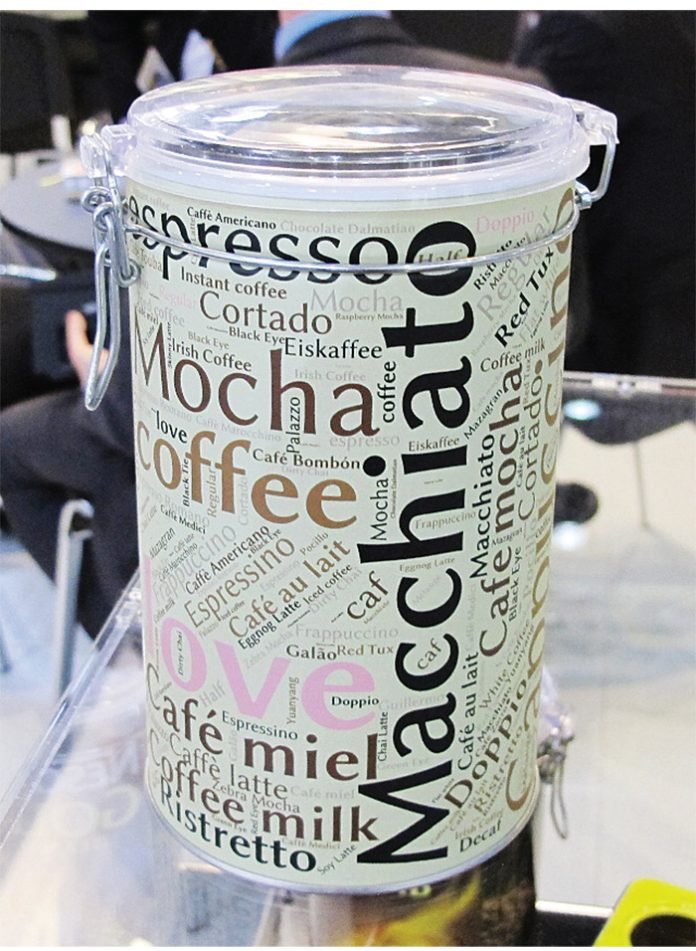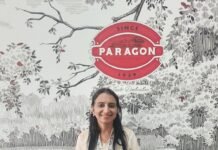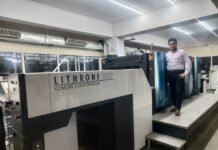Metpack is a small specialized fair in Essen, a city which for centuries has been dominated by the Krupp family’s iron works in the heart of Germany’s main coal and steel centre, the Ruhr district. Held on five days every three years around the same time as interpack in nearby Düsseldorf, it brings together every kind of supplier to the can manufacturing industry. This time, with 243 exhibitors and a little over 7,000 visitors, the show has been at the same time as quiet and as busy as in earlier years, as attendees are focused and limited to professionals from this particular industry sector. Europeon editor Ron Augustin reports.
The can-making business can be divided into three segments, each with their
own technologies: three-piece cans, two-piece cans, and, since recently, monoblock cans. Three-piece cans and containers are usually coated and (offset) printed in sheets before being welded together. Two-piece cans are usually pre-formed as tubes, then printed in flexo, dry-offset letterpress or inkjet, before being ‘necked’ and, subsequently, closed in the filling process with a sealing device mostly including some sort of lid. Mono cans are formed into one piece from (pre- coated) sheets or coils before they are subsequently printed and necked and threaded as to hold screwable (metal) caps or aerosol closures. Most beverage, food and aerosol cans are made of aluminium, but steel, once on the decline, is again an
increasingly popular metal for food, beverages and luxury packaging.
Three-piece containers are still the leading technology in the food industry, whereas two-piece beverage cans dominate the drinks market and account for 60% of all cans. Crown and Ardagh are the leading manufacturers of three-piece containers. Ball, Rexam, Crown, Ardagh, MCC and Can Pack account for three- quarters of the two-piece production. In total, metal packaging amounted to an estimated US$ 400 billion in 2012, of which close to US$ 340 billion is of cans. In number of units, more than 300 billion cans were produced in 2013, of which 105 billion were in North America, 95 billion in Asia, and 65 billion in Europe. Currently, the largest growth rates are in aerosol cans and cosmetics.
Metpack 2014 brought together a quite representative range of suppliers to this industry, with material suppliers such as Amcor, Arcelor-Mittal, Chongqing, ContiTech, Handan, Henkel, Inx, ITP, J+S, Jiangyin Comat, Maloberti, Metlac, Sun Chemical Hartmann, ThyssenKrupp, Tital, Trelleborg and Z+G; inspection systems from Applied Vision, AVT, Canneed, Eagle Vision, Ibea, Muehlbauer, OneVision, Prime Controls, Sencon, Torus and others; coating and curing systems from Altana- Actega, Crabtree, GEW, IST Metz and Nordson; hundreds of can-making machines and tooling, conveying and handling systems; and several presses for printing on metal sheets and cans.
The largest chunk of the show, the actual can-making equipment, was presented mainly by German, Swiss, Italian, Chinese, Swiss, US, Taiwanese and Turkish manufacturers, including, among others, Bati, Bibra, Cantec, Crown-owned Carnaud, Ball-owned CDL, Fujian, Golden Eagle, Guangdong Hanjiang, Mall + Herlan, Marmara, Mecano, Remy, Sabatier, Sanyu, Shin-I and Zhoushan Putuo. Mall + Herlan, for instance, introduced new production lines for impact- extruded collapsible aluminium tubes, the TMC 170 and 200, which can handle tube diameters of 13.5 to 45 mm for annual volumes of 50 million pieces and upwards, and new versions of its production lines for impact-extruded monoblock aerosol cans, the CMC 200 and 250 for volumes of 60 or 75 million pieces and upwards. It also launched the MH Hi-Flex front end for the production of monoblock aerosol cans from aluminium or steel coils, and presented the high- speed bottle necking and shaping machine with speeds between 500 and 3,000
bottles per minute. The first of these machines called the Bottlemaker has been installed in the US and a part of the large machine was on display at Metpack with an accompanying video showing how the machine works and displays holding samples produced by it.
Mall + Herlan is the metal packaging arm of Wifag Polytype, which comprises Wifag and Solna for web offset presses and Polytype for digital and dry-offset printing, coating, laminating, and plastic tubes and containers. With a workforce of 1,000, the company has manufacturing and service entities in Switzerland, Germany, Italy, Holland, Belgium, USA, Thailand, Brazil, China and India.
Dry-offset letterpress, offset and inkjet presses were showcased by Durst, Fuji Kikai, Hinterkopf, Intercan, Jiangsu Huayu, KBA-MetalPrint, Moss, Omso and Technopack-Martinenghi. Mall + Herlan included coating and printing functionalities in some of its can-making lines. Two metal sheet printing houses also presented their services at the show: KMP from Korea and Qian’sa SiWenKeDe from China.
Although dry-offset letterpress is still the main technology in use for the sidewall printing of (two-piece) cans, inkjet is rapidly gaining ground. However, wet offset printing on metal sheets is also widespread, and KBA-MetalPrint is clearly the market leader in this segment. Part of the recently reorganised KBA Group (which also includes KBA Radebeul, KBA Digital Web, KBA-Flexotecnica, KBA-MePrint, KBA- Metronic and KBA-Kammann), KBA-MetalPrint launched a new press at Metpack, the MetalStar 3, and also showed the Mailaender 280 released in late 2013. The Mailaender 280 with six printing units and speeds of up to 7,500 sheets per hour, and the MetalStar 3 with up to 12 units and speeds of up to 10,000 sheets per hour both are improvements of earlier models, highly automated in areas such as presetting, inking, plate changing, register, ink and dampening control, washing and sheet size changeovers.
From India, Cans India had a stand as a used equipment trader, Dodia showcased its entire Decap Closures range of plastic closures, and Hindustan Tin Works offered its can-making services. The largest exhibitor groups at this trade fair came from Germany and Italy (around 50 each), USA (34), China (28), the UK (20) and Switzerland (15). In all, 43 exhibitors from Asia-Pacific including manufacturers from Australia, China, India, Japan, Korea, Singapore, Taiwan and Thailand had stands at Metpack, many of whom also attended interpack.
The next Metpack has been planned to take place in May 2017.














